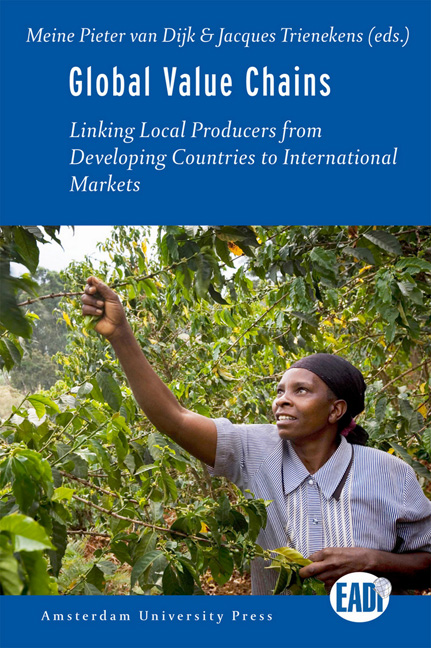Book contents
- Frontmatter
- Contents
- Part I Theoretical Contributions
- Part II Local Agricultural Value Chains
- Part III International Agricultural Value Chains
- Part IV Value Chains in the Industrial and Services Sector
- Part V Conclusions: Upgrading Value Chains in Developing Countries
- About the Authors
- Index
- Miscellaneous Endmatter
7 - Using a Partnership to Achieve Sustainable Development of the Palm Oil Value Chain in Malaysia
Published online by Cambridge University Press: 19 January 2021
- Frontmatter
- Contents
- Part I Theoretical Contributions
- Part II Local Agricultural Value Chains
- Part III International Agricultural Value Chains
- Part IV Value Chains in the Industrial and Services Sector
- Part V Conclusions: Upgrading Value Chains in Developing Countries
- About the Authors
- Index
- Miscellaneous Endmatter
Summary
Introduction
Partnerships have become important for economic development. At the World Summit on Sustainable Development (WSSD) in Johannesburg in 2002, goals for sustainable development have been set. World leaders concluded that agricultural trade and market dynamics can play a major role in achieving sustainable development and eradicating poverty. In order to profit from trade, however, countries must ensure that their products meet the high quality standards in the field of health, food safety, social standards and environment of developed countries. Food safety and agricultural health standards can impede trade, especially for developing countries, through explicit bans on imports of particular products or through the high costs of compliance with stringent standards, which can diminish competitiveness. The combined effects of institutional weakness and rising compliance costs could contribute to the further marginalization of weaker economic players, including poor countries, small businesses, and smallholder farmers (Aksoy and Beghin, 2005). Yet in certain circumstances, the new landscape of proliferation and increasingly stringent food safety can be a basis for the competitive repositioning and enhanced export performance. Standards can also provide incentives for modernizing global value chains and help clarify the necessary and appropriate risk-management functions of government. The greater attention to good practices in agricultural value chains may not only improve export competitiveness, but also generate spillover benefits to domestic consumers. From this perspective, standards can provide the basis for more sustainable and profitable agricultural exports in the long term (World Bank, 2008).
International experience highlights the respective roles of the government and the private sector to meet challenges in export of high-value agricultural products. Public-private partnerships can be important in conducting research and capacity building to develop agricultural practices, meet the new domestic and international sanitary and phytosanitary standards (SPS), and train and assist farmers to adopt them (World Bank, 2008). Not only in the agricultural sector have cross-sector partnerships among various levels of government, business/industry, nongovernmental organizations and communities become a key strategy for economic development and improving environmental, social and community outcomes. Practical experiments with partnerships have been undertaken in numerous areas of public policy, in both developed and developing countries.
- Type
- Chapter
- Information
- Global Value ChainsLinking Local Producers from Developing Countries to International Markets, pp. 137 - 162Publisher: Amsterdam University PressPrint publication year: 2012

